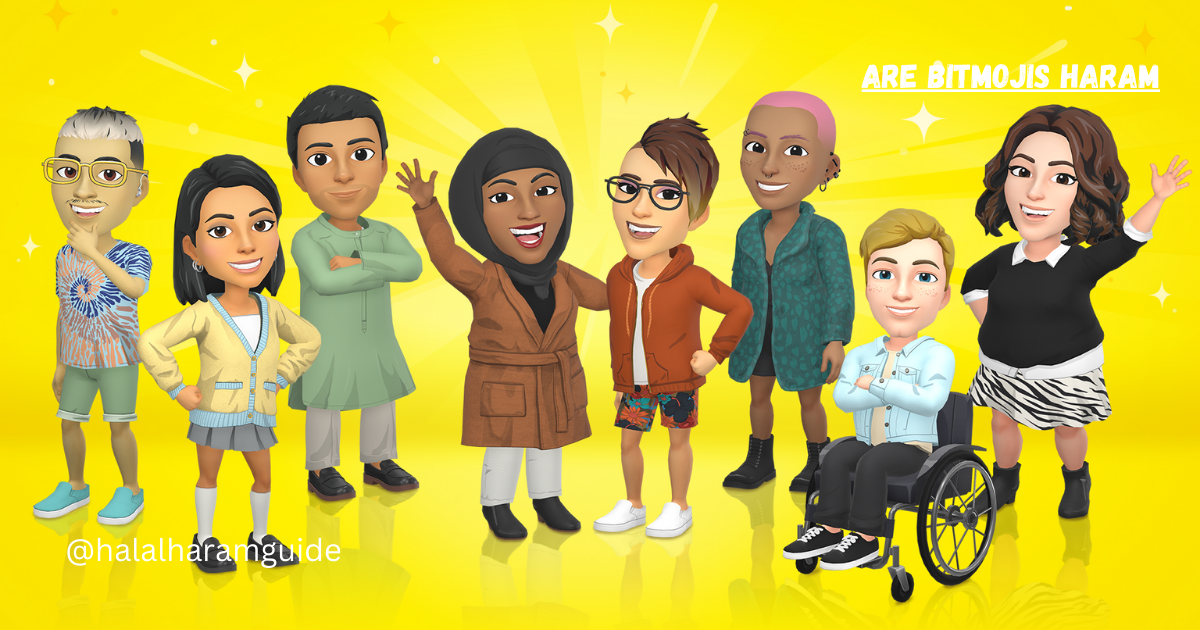Let’s talk about the topic “Are Bitmojis Haram?”
In the rapidly evolving world of digital communication, emojis and avatars have become a common form of self-expression.However, as with many aspects of modern technology, questions have arisen about the permissibility of using Bitmojis in Islamic practice.
This blog post aims to delve into the question: Are Bitmojis haram in Islam? We’ll explore the perspectives, considerations, and guidelines surrounding the use of Bitmojis in the context of Islamic ethics and values, providing a clear understanding of how Muslims can navigate this aspect of the digital age.
Let’s start
What are Bitmojis?
Bitmoji is a popular digital avatar creation platform and app that allows users to create personalised cartoon-like representations of themselves. These avatars, known as Bitmojis, can be customised in terms of appearance, including hairstyle, facial features, clothing, and accessories. Once created, Bitmojis can be used in various digital communication contexts, such as messaging apps, social media platforms, and even in emails.
Bitmoji avatars are often used to add a personal touch to digital conversations and express emotions or reactions visually. Users can choose from a wide range of Bitmoji stickers and animations to convey different messages and moods.
One of the notable features of Bitmoji is its integration with popular messaging apps like Snapchat, allowing users to use their Bitmoji avatars as stickers or animations within the app. This integration has made Bitmoji a widely used tool for personalising and enhancing digital communication.
Overall, Bitmoji is a fun and creative way for individuals to represent themselves in the digital world and add a touch of personalization to their online interactions.
Are Bitmojis Haram?
The permissibility of using Bitmojis depends on how they are used and the content associated with them. Here are some factors to consider:
Content and Usage: Using Bitmojis for friendly, respectful, and non-offensive communication is generally considered permissible in Islam. They can be used to express emotions, reactions, and personal style in digital conversations.
Respect for Islamic Ethics: It is important to ensure that the content and context in which Bitmojis are used align with Islamic ethics and values. Avoid using Bitmojis for inappropriate, disrespectful, or offensive purposes.
Avoiding Inappropriate Symbols: Bitmoji avatars should not contain or promote symbols, messages, or actions that are explicitly haram, such as promoting immorality, indecency, or unethical behaviour.
Privacy and Modesty: Muslims should also be mindful of privacy and modesty when creating and sharing Bitmoji avatars. Avoid sharing personal or revealing information through Bitmojis.
Understand difference between Bitmojis And Emojis
Emojis:
Universal Symbols: Emojis are standardised, universal symbols that represent various emotions, objects, actions, and expressions. They are part of the Unicode character set, which means that emojis have consistent meanings across different devices and platforms.
Limited Customization: Emojis cannot be customised or personalised by individual users. They come in a fixed set of designs and are generally not customizable in terms of appearance.
Simplicity: Emojis are simple and stylized representations of emotions or objects. They are typically small, easy to recognize, and often consist of basic shapes and facial expressions.
Widespread Use: Emojis are widely used in digital communication on various platforms, including text messaging, social media, emails, and more. They are a common and standardised way to express emotions and reactions.
Bitmojis:
Personalised Avatars: Bitmojis are personalised avatars created by individual users. Users can customise the appearance of their Bitmoji, including hairstyle, facial features, clothing, and accessories. This customization allows users to create a unique digital representation of themselves.
Individual Creation: Bitmojis are not standardised symbols like emojis; each user creates their own Bitmoji. This means that Bitmojis can vary significantly in appearance from one user to another.
Greater Detail: Bitmojis often feature more detailed and customizable designs compared to emojis. Users can create Bitmojis that closely resemble their real-life appearance or create entirely fictional characters.
Integration: Bitmojis are often integrated into specific apps or platforms. For example, Bitmoji is integrated with Snapchat, allowing users to use their Bitmojis as stickers or animations within the app.
Personal Expression: Bitmojis are a way for users to express their individuality and personality in digital communication. They provide a more personalised and creative means of self-expression compared to standardised emojis.
Why Are Bitmojis Haram?
Bitmojis themselves are not inherently haram (forbidden) in Islam. They are a form of digital avatar or cartoon-like representation that individuals can create to personalise their online presence and add a touch of self-expression to their digital communications. Whether Bitmojis are considered haram or permissible depends on how they are used and the context in which they are used.
Here are some factors to consider:
Content and Usage: The permissibility of Bitmojis depends on how they are used and the content associated with them. Using Bitmojis for friendly, respectful, and non-offensive communication is generally considered permissible in Islam. They can be used to express emotions, reactions, and personal style in digital conversations.
Respect for Islamic Ethics: It is important to ensure that the content and context in which Bitmojis are used align with Islamic ethics and values. Avoid using Bitmojis for inappropriate, disrespectful, or offensive purposes.
Avoiding Inappropriate Symbols: Bitmoji avatars should not contain or promote symbols, messages, or actions that are explicitly haram, such as promoting immorality, indecency, or unethical behaviour.
Privacy and Modesty: Muslims should also be mindful of privacy and modesty when creating and sharing Bitmoji avatars. Avoid sharing personal or revealing information through Bitmojis.
Is Snapchat Bitmoji Haram In Islam?
The permissibility of using Snapchat Bitmoji in Islam, like the use of Bitmoji in general, is not inherently haram (forbidden). Bitmoji avatars on Snapchat are customizable digital representations that users can create to personalise their profiles and add a touch of self-expression to their interactions on the platform. However, whether using Snapchat Bitmoji is considered haram depends on how they are used and the content associated with them.
Muslims are encouraged to use digital tools and platforms responsibly and in a manner consistent with Islamic values and ethics. Using Snapchat Bitmoji for friendly and respectful communication, such as expressing emotions, reactions, or personal style, is generally considered permissible in Islam. It can enhance digital interactions and add a personal touch to conversations.
However, it is important to ensure that the content and context in which Snapchat Bitmoji are used align with Islamic ethics and values. Avoid using Bitmojis for inappropriate, disrespectful, or offensive purposes. Additionally, Bitmoji avatars should not contain or promote symbols, messages, or actions that are explicitly haram, such as promoting immorality, indecency, or unethical behaviour.
What are the perspectives of Scholars on Bitmojis?
Permissible Personal Expression:
Some scholars may view Bitmojis as a form of personal expression and creativity in the digital age. They may see them as a harmless way for individuals to add a touch of self-representation to their online interactions, similar to how people might choose their clothing or hairstyle in the physical world.
Responsibility and Ethical Usage:
Scholars are likely to emphasise responsible and ethical usage of Bitmojis. They may encourage users to avoid creating avatars that promote inappropriate or offensive content, as well as symbols or actions that go against Islamic principles.
Privacy and Modesty:
Scholars may remind users to exercise caution when creating Bitmojis, considering issues of privacy and modesty. Users should avoid sharing personal or revealing information through their avatars.
Avoidance of Haram Content:
Scholars are likely to advise against using Bitmojis for purposes that involve haram activities or content, such as promoting indecency, immorality, or unethical behaviour.
Conclusion:
In conclusion, Bitmojis themselves are not inherently haram (forbidden) in Islam. Their permissibility depends on how they are used and the content associated with them.
Bitmojis can be a form of digital self-expression and communication, and many Muslims use them responsibly for harmless and friendly interactions.
However, it is essential for individuals to use Bitmojis in a manner that aligns with Islamic ethics and values, avoiding content or actions that violate Islamic principles.
As with many aspects of modern technology, the key is responsible usage and adherence to Islamic principles.
FAQs
Is Bitmoji haram?
Bitmojis themselves are not inherently haram. Their permissibility depends on how they are used and the context in which they are used.
Is it haram to have a Bitmoji?
Having a Bitmoji is not inherently haram. It is a form of digital self-expression that users can choose to create for fun and personalization.
Is it haram to have a Bitmoji on Snapchat?
Having a Bitmoji on Snapchat is not inherently haram. The permissibility depends on how the Bitmoji is used and whether it adheres to Islamic ethics and values in digital interactions.
Is creating a Bitmoji haram?
Creating a Bitmoji is not inherently haram. It is a creative and personal way for users to represent themselves in the digital world.
Is avatar haram in Islam?
Avatars, in and of themselves, are not inherently haram in Islam. Avatars are digital representations of individuals and can be used for various purposes, including online profiles and gaming. The permissibility of avatars depends on how they are used and whether their usage aligns with Islamic ethics and values.
Why is Bitmoji haram?
Bitmoji itself is not inherently haram. Whether Bitmoji is considered haram or halal depends on how it is used and the content associated with it. If Bitmoji is used for inappropriate or offensive purposes, it may be seen as haram. However, for most users, Bitmoji is a tool for self-expression and communication and is not inherently haram.
Is Bitmoji haram or halal?
Bitmoji is not inherently haram or halal. Its permissibility depends on how it is used and whether it adheres to Islamic principles and ethics in digital interactions. Many Muslims use Bitmoji for harmless and friendly communication.
Is making an avatar haram in Islam?
Making an avatar is not inherently haram in Islam. The permissibility of creating avatars depends on how they are used and whether they align with Islamic ethics and values. Muslims should exercise discretion and use avatars responsibly, avoiding content or actions that violate Islamic principles.
- “Is Lobster Halal? Understanding Its Permissibility”
- “Is Drawing Haram in Islam? Understanding the Perspective”
- “Is Fermented Kimchi Halal? Exploring Kimchi’s Halal Status”
- “Is Collagen Halal? Unveiling the Halal Status of Collagen”
- “Is Wine Vinegar Halal? Unveiling Its Permissibility”


